- Home
- Octavia E. Butler
Kindred Page 3
Kindred Read online
Page 3
“What’s the date?”
“I don’t know.”
“The year! Just tell me the year!”
He glanced across the room toward the door, then quickly back at me. I realized I was making him nervous with my ignorance and my sudden intensity. I forced myself to speak calmly. “Come on, Rufe, you know what year it is, don’t you?”
“It’s … eighteen fifteen.”
“When?”
“Eighteen fifteen.”
I sat still, breathed deeply, calming myself, believing him. I did believe him. I wasn’t even as surprised as I should have been. I had already accepted the fact that I had moved through time. Now I knew I was farther from home than I had thought. And now I knew why Rufus’s father used his whip on “niggers” as well as horses.
I looked up and saw that the boy had left his chair and come closer to me.
“What’s the matter with you?” he demanded. “You keep acting sick.”
“It’s nothing, Rufe. I’m all right.” No, I was sick. What was I going to do? Why hadn’t I gone home? This could turn out to be such a deadly place for me if I had to stay in it much longer. “Is this a plantation?” I asked.
“The Weylin plantation. My daddy’s Tom Weylin.”
“Weylin …” The name triggered a memory, something I hadn’t thought of for years. “Rufus, do you spell your last name, W-e-y-l-i-n?”
“Yeah, I think that’s right.”
I frowned at him impatiently. A boy his age should certainly be sure of the spelling of his own name—even a name like this with an unusual spelling.
“It’s right,” he said quickly.
“And … is there a black girl, maybe a slave girl, named Alice living around here somewhere?” I wasn’t sure of the girl’s last name. The memory was coming back to me in fragments.
“Sure. Alice is my friend.”
“Is she?” I was staring at my hands, trying to think. Every time I got used to one impossibility, I ran into another.
“She’s no slave, either,” said Rufus. “She’s free, born free like her mother.”
“Oh? Then maybe somehow …” I let my voice trail away as my thoughts raced ahead of it fitting things together. The state was right, and the time, the unusual name, the girl, Alice …
“Maybe what?” prompted Rufus.
Yes, maybe what? Well, maybe, if I wasn’t completely out of my mind, if I wasn’t in the middle of the most perfect hallucination I’d ever heard of, if the child before me was real and was telling the truth, maybe he was one of my ancestors.
Maybe he was my several times great grandfather, but still vaguely alive in the memory of my family because his daughter had bought a large Bible in an ornately carved, wooden chest and had begun keeping family records in it. My uncle still had it.
Grandmother Hagar. Hagar Weylin, born in 1831. Hers was the first name listed. And she had given her parents’ names as Rufus Weylin and Alice Green-something Weylin.
“Rufus, what’s Alice’s last name?”
“Greenwood. What were you talking about? Maybe what?”
“Nothing. I … just thought I might know someone in her family.”
“Do you?”
“I don’t know. It’s been a long time since I’ve seen the person I’m thinking of.” Weak lies. But they were better than the truth. As young as the boy was, I thought he would question my sanity if I told the truth.
Alice Greenwood. How would she marry this boy? Or would it be marriage? And why hadn’t someone in my family mentioned that Rufus Weylin was white? If they knew. Probably, they didn’t. Hagar Weylin Blake had died in 1880, long before the time of any member of my family that I had known. No doubt most information about her life had died with her. At least it had died before it filtered down to me. There was only the Bible left.
Hagar had filled pages of it with her careful script. There was a record of her marriage to Oliver Blake, and a list of her seven children, their marriages, some grandchildren … Then someone else had taken up the listing. So many relatives that I had never known, would never know.
Or would I?
I looked over at the boy who would be Hagar’s father. There was nothing in him that reminded me of any of my relatives. Looking at him confused me. But he had to be the one. There had to be some kind of reason for the link he and I seemed to have. Not that I really thought a blood relationship could explain the way I had twice been drawn to him. It wouldn’t. But then, neither would anything else. What we had was something new, something that didn’t even have a name. Some matching strangeness in us that may or may not have come from our being related. Still, now I had a special reason for being glad I had been able to save him. After all … after all, what would have happened to me, to my mother’s family, if I hadn’t saved him?
Was that why I was here? Not only to insure the survival of one accident-prone small boy, but to insure my family’s survival, my own birth.
Again, what would have happened if the boy had drowned? Would he have drowned without me? Or would his mother have saved him somehow? Would his father have arrived in time to save him? It must be that one of them would have saved him somehow. His life could not depend on the actions of his unconceived descendant. No matter what I did, he would have to survive to father Hagar, or I could not exist. That made sense.
But somehow, it didn’t make enough sense to give me any comfort. It didn’t make enough sense for me to test it by ignoring him if I found him in trouble again—not that I could have ignored any child in trouble. But this child needed special care. If I was to live, if others were to live, he must live. I didn’t dare test the paradox.
“You know,” he said, peering at me, “you look a little like Alice’s mother. If you wore a dress and tied your hair up, you’d look a lot like her.” He sat down companionably beside me on the bed.
“I’m surprised your mother didn’t mistake me for her then,” I said.
“Not with you dressed like that! She thought you were a man at first, just like I did—and like Daddy did.”
“Oh.” That mistake was a little easier to understand now.
“Are you sure you aren’t related to Alice yourself?”
“Not that I know of,” I lied. And I changed the subject abruptly. “Rufe, are there slaves here?”
He nodded. “Thirty-eight slaves, Daddy said.” He drew his bare feet up and sat cross-legged on the bed facing me, still examining me with interest. “You’re not a slave, are you?”
“No.”
“I didn’t think so. You don’t talk right or dress right or act right. You don’t even seem like a runaway.”
“I’m not.”
“And you don’t call me ‘Master’ either.”
I surprised myself by laughing. “Master?”
“You’re supposed to.” He was very serious. “You want me to call you black.”
His seriousness stopped my laughter. What was funny, anyway? He was probably right. No doubt I was supposed to give him some title of respect. But “Master”?
“You have to say it,” he insisted. “Or ‘Young Master’ or … or ‘Mister’ like Alice does. You’re supposed to.”
“No.” I shook my head. “Not unless things get a lot worse than they are.”
The boy gripped my arm. “Yes!” he whispered. “You’ll get into trouble if you don’t, if Daddy hears you.”
I’d get into trouble if “Daddy” heard me say anything at all. But the boy was obviously concerned, even frightened for me. His father sounded like a man who worked at inspiring fear. “All right,” I said. “If anyone else comes, I’ll call you ‘Mister Rufus.’ Will that do?” If anyone else came, I’d be lucky to survive.
“Yes,” said Rufus. He looked relieved. “I still have scars on my back where Daddy hit me with the whip.”
“I saw them.” It was time for me to get out of this house. I had done enough talking and learning and hoping to be transported home. It was clear that whatever power had use
d me to protect Rufus had not provided for my own protection. I had to get out of the house and to a place of safety before day came—if there was a place of safety for me here. I wondered how Alice’s parents managed, how they survived.
“Hey!” said Rufus suddenly.
I jumped, looked at him, and realized that he had been saying something—something I had missed.
“I said what’s your name?” he repeated. “You never told me.”
Was that all? “Edana,” I said. “Most people call me Dana.”
“Oh, no!” he said softly. He stared at me the way he had when he thought I might be a ghost.
“What’s wrong?”
“Nothing, I guess, but … well, you wanted to know if I had seen you this time before you got here the way I did at the river. Well, I didn’t see you, but I think I heard you.”
“How? When?”
“I don’t know how. You weren’t here. But when the fire started and I got so scared, I heard a voice, a man. He said, ‘Dana?’ Then he said, ‘Is it happening again?’ And someone else—you—whispered, ‘I think so.’ I heard you!”
I sighed wearily, longing for my own bed and an end to questions that had no answers. How had Rufus heard Kevin and me across time and space? I didn’t know. I didn’t even have time to care. I had other more immediate problems.
“Who was the man?” Rufus asked.
“My husband.” I rubbed a hand across my face. “Rufe, I have to get out of here before your father wakes up. Will you show me the way downstairs so that I don’t awaken anyone?”
“Where will you go?”
“I don’t know, but I can’t stay here.” I paused for a moment wondering how much he could help me—how much he would help me. “I’m a long way from home,” I said, “and I don’t know when I’ll be able to get back there. Do you know of anyplace I could go?”
Rufus uncrossed his legs and scratched his head. “You could go outside and hide until morning. Then you could come out and ask Daddy if you could work here. He hires free niggers sometimes.”
“Does he? If you were free and black, do you think you’d want to work for him?”
He looked away from me, shook his head. “I guess not. He’s pretty mean sometimes.”
“Is there someplace else I could go?”
He did some more thinking. “You could go to town and find work there.”
“What’s the name of the town?”
“Easton.”
“Is it far?”
“Not so far. The niggers walk there sometimes when Daddy gives them a pass. Or maybe …”
“What?”
“Alice’s mother lives closer. You could go to her, and she could tell you the best places to go to get work. You could stay with her too, maybe. Then I might see you again before you go home.”
I was surprised he wanted to see me again. I hadn’t had much contact with children since I’d been one myself. Somehow, I found myself liking this one, though. His environment had left its unlikable marks on him, but in the ante bellum South, I could have found myself at the mercy of someone much worse—could have been descended from someone much worse.
“Where can I find Alice’s mother?” I asked.
“She lives in the woods. Come on outside, and I’ll tell you how to get there.”
He took his candle and went to the door of his room. The room’s shadows moved eerily as he moved. I realized suddenly how easy it would be for him to betray me—to open the door and run away or shout an alarm.
Instead, he opened the door a crack and looked out. Then he turned and beckoned to me. He seemed excited and pleased, and only frightened enough to make him cautious. I relaxed, followed him quickly. He was enjoying himself—having an adventure. And, incidentally, he was playing with fire again, helping an intruder to escape undetected from his father’s house. His father would probably take the whip to both of us if he knew.
Downstairs, the large heavy door opened noiselessly and we stepped into the darkness outside—the near darkness. There was a half-moon and several million stars lighting the night as they never did at home. Rufus immediately began to give me directions to his friend’s house, but I stopped him. There was something else to be done first.
“Where would the draperies have fallen, Rufe? Take me to them.”
He obeyed, taking me around a corner of the house to the side. There, what was left of the draperies lay smoking on the ground.
“If we can get rid of this,” I said, “can you get your mother to give you new draperies without telling your father?”
“I think so,” he said. “They hardly talk to each other anyway.”
Most of the remnants of the drapes were cold. I stamped out the few that were still edged in red and threatening to flame up again. Then I found a fairly large piece of unburned cloth. I spread it out flat and filled it with smaller pieces and bits of ash and whatever dirt I scooped up along with them. Rufus helped me silently. When we were finished, I rolled the cloth into a tight bundle and gave it to him.
“Put it in your fireplace,” I told him. “Watch to see that it all burns before you go to sleep. But, Rufe … don’t burn anything else.”
He glanced downward, embarrassed. “I won’t.”
“Good. There must be safer ways of annoying your father. Now which way is it to Alice’s house?”
3
He pointed the way, then left me alone in the silent chilly night. I stood beside the house for a moment feeling frightened and lonely. I hadn’t realized how comforting the boy’s presence had been. Finally, I began walking across the wide grassy land that separated the house from the fields. I could see scattered trees and shadowy buildings around me. There was a row of small buildings off to one side almost out of sight of the house. Slave cabins, I supposed. I thought I saw someone moving around one of them, and for a moment, I froze behind a huge spreading tree. The figure vanished silently between two cabins—some slave, probably as eager as I was to avoid being caught out at night.
I skirted around a field of some grassy waist-high crop I didn’t even try to identify in the dim light. Rufus had told me his short cut, and that there was another longer way by road. I was glad to avoid the road, though. The possibility of meeting a white adult here frightened me, more than the possibility of street violence ever had at home.
Finally, there was a stand of woods that looked like a solid wall of darkness after the moonlit fields. I stood before it for several seconds wondering whether the road wouldn’t be a better idea after all.
Then I heard dogs barking—not too far away by their sound—and in sudden fear, I plunged through a tangle of new young growth and into the trees. I wondered about thorns, poison ivy, snakes … I wondered, but I didn’t stop. A pack of half-wild dogs seemed worse. Or perhaps a pack of tame hunting dogs used to tracking runaway slaves.
The woods were not as totally dark as they had seemed. I could see a little after my eyes grew accustomed to the dimness. I could see trees, tall and shadowy—trees everywhere. As I walked on, I began to wonder how I could be sure I was still going in the right direction. That was enough. I turned around—hoping that I still knew what “around” meant, and headed back toward the field. I was too much of a city woman.
I got back to the field all right, then veered left to where Rufus had said there was a road. I found the road and followed it, listening for the dogs. But now, only a few night birds and insects broke the silence—crickets, an owl, some other bird I had no name for. I hugged the side of the road, trying to suppress my nervousness and praying to go home.
Something dashed across the road so close to me that it almost brushed my leg. I froze, too terrified even to scream, then realized that it was just some small animal that I had frightened—a fox, perhaps, or a rabbit. I found myself swaying a little, swaying dizzily. I collapsed to my knees, desperately willing the dizziness to intensify, the transferal to come …
I had closed my eyes. When I opened them, the dirt path an
d the trees were still there. I got up wearily and began walking again.
When I had been walking for a while, I began to wonder whether I had passed the cabin without seeing it. And I began to hear noises—not birds or animals this time, not anything I could identify at first. But whatever it was, it seemed to be coming closer. It took me a ridiculously long time to realize that it was the sound of horses moving slowly down the road toward me.
Just in time, I dove into the bushes.
I lay still, listening, shaking a little, wondering whether the approaching horsemen had seen me. I could see them now, dark, slowly moving shapes going in a direction that would eventually take them past me on toward the Weylin house. And if they saw me, they might take me along with them as their prisoner. Blacks here were assumed to be slaves unless they could prove they were free—unless they had their free papers. Paperless blacks were fair game for any white.
And these riders were white. I could see that in the moonlight as they came near. Then they turned and headed into the woods just a few feet from me. I watched and waited, keeping absolutely still until they had all gone past. Eight white men out for a leisurely ride in the middle of the night. Eight white men going into the woods in the area where the Greenwood cabin was supposed to be.
After a moment of indecision, I got up and followed them, moving carefully from tree to tree. I was both afraid of them and glad of their human presence. Dangerous as they could be to me, somehow, they did not seem as threatening as the dark shadowy woods with its strange sounds, its unknowns.
As I had expected, the men led me to a small log cabin in a moonlit clearing in the woods. Rufus had told me I could reach the Greenwood cabin by way of the road, but he hadn’t told me the cabin sat back out of sight of the road. Maybe it didn’t. Maybe this was someone else’s cabin. I half hoped it was because if the people inside this cabin were black, they were almost certainly in for trouble.
Four of the riders dismounted and went to hit and kick the door. When no one answered their pounding, two of them began trying to break it down. It looked like a heavy door—one more likely to break the men’s shoulders than it was to give. But apparently the latch used to keep it shut wasn’t heavy. There was a sound of splintering wood, and the door swung inward. The four men rushed in with it, and a moment later, three people were shoved, almost thrown out of the cabin. Two of them—a man and woman—were caught by the riders outside who had dismounted, apparently expecting them. The third, a little girl dressed in something long and light colored, was allowed to fall to the ground and scramble away, ignored by the men. She moved to within a few yards of where I lay in the bushes near the edge of the clearing.

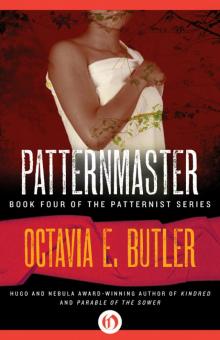 Patternmaster
Patternmaster Survivor
Survivor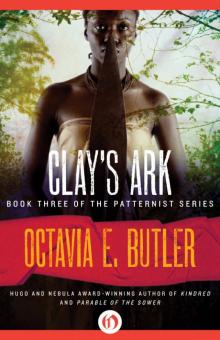 Clay's Ark
Clay's Ark Bloodchild and Other Stories
Bloodchild and Other Stories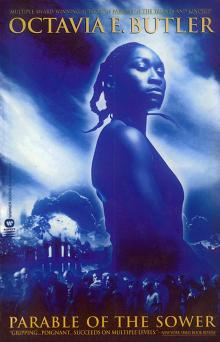 Parable of the Sower
Parable of the Sower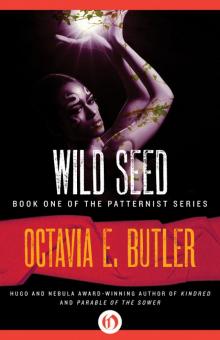 Wild Seed
Wild Seed Fledgling
Fledgling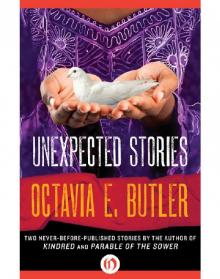 Unexpected Stories
Unexpected Stories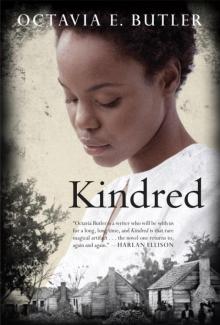 Kindred
Kindred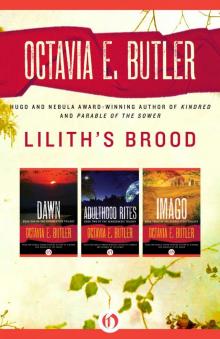 Lilith's Brood: Dawn / Adulthood Rites / Imago
Lilith's Brood: Dawn / Adulthood Rites / Imago Adulthood Rites
Adulthood Rites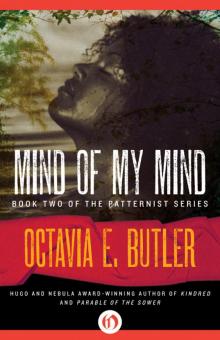 Mind of My Mind
Mind of My Mind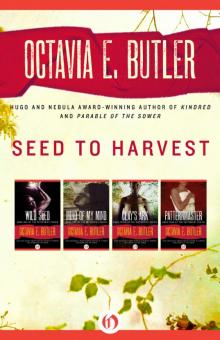 Seed to Harvest
Seed to Harvest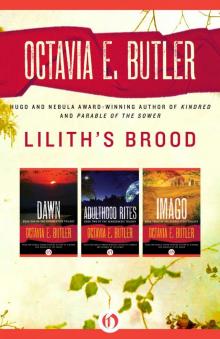 Lilith's Brood: Dawn, Adulthood Rites, and Imago (Xenogenesis Trilogy)
Lilith's Brood: Dawn, Adulthood Rites, and Imago (Xenogenesis Trilogy) Bloodchild
Bloodchild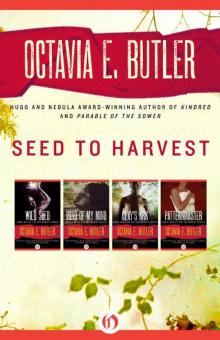 Seed to Harvest: Wild Seed, Mind of My Mind, Clay's Ark, and Patternmaster (Patternist)
Seed to Harvest: Wild Seed, Mind of My Mind, Clay's Ark, and Patternmaster (Patternist)